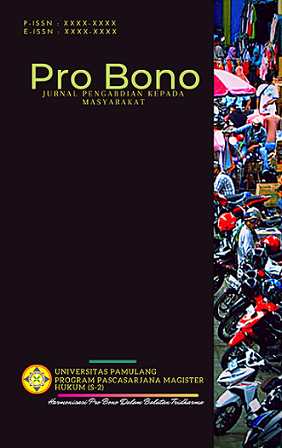URGENSI PENDAFTARAN TANAH SEBAGAI HAK MILIK UNTUK PERTAMA KALI
Abstract
Land registration is a series of activities carried out by the state/government continuously and regularly, in the form of collecting certain information or data regarding certain lands in certain areas, processing, storing and presenting them for the benefit of the people, in the context of provide guarantees of legal certainty in the land sector, including the issuance of evidence for its maintenance. The concept of regularity that all activities must be based on appropriate statutory regulations, because the results will be evidence according to law, even though the power of proof is not always the same in the laws of countries that organize land registration. One of the rules governing land registration is the Basic Agrarian Law (UUPA), the LoGA is a basic regulation that regulates the control, ownership, designation, use, and control of land use with the aim of managing and utilizing land for the greatest prosperity of the people. One of the aspects needed for this purpose is the certainty of land rights which is the main basis for legal certainty of land ownership. Formulation of the First Problem, How is the Strength and Legal Certainty of Certificates Issued Through Recognition of Rights, Second, the obstacles found in land registration and how to resolve them. The type of this research is comparative descriptive, which describes the real conditions in practice and then tries to compare them with the regulations that have to do with the problem. With comparative descriptive research, it is hoped that an overview of factual data related to the First Land Registration can be obtained. As explained in the previous discussion, the purpose of land registration is to provide legal certainty and legal protection to land rights holders, apartment unit owners, and mortgage holders. In addition, it is also intended to provide information to interested parties and the Government to obtain data on a plot of land, as well as for the orderly implementation of land administration. Article 23 paragraph (1) of the BAL states: "Ownership rights, as well as any transfers, cancellations, and encumbrances thereof with other rights must be registered according to the provisions referred to in Article 19". Systematic land registration requires a small fee but takes a long time, because systematic land registration in the form of prona is only carried out once a year.
Keywords: land registration, property rights, the first time.
References
A.P. Parlindungan, Pendaftaran Tanah di Indonesia, (Mandar Maju, Bandung, 1999) hlm 18
Boedi Harsono, Hukum Agraria Indonesia : Sejarah Pembentukan Undang-Undang Pokok Agraria, Isi dan pelaksanaanya, Jakarta:Djambatan, 2005, hlm, 72-73.
Badan Pertanahan Nasional, 1997. Hasil Rapat Kerja Kantor Menteri Negara Agraria dan Badan Pertanahan Nasional, Jakarta 2-5 Maret 1997, hlm 46.
Iqbal, M. (2018). Implementasi Efektifitas Asas Oportunitas di Indonesia Dengan Landasan Kepentingan Umum. Jurnal Surya Kencana Satu: Dinamika Masalah Hukum dan Keadilan, 9(1), 87-100.
Iqbal, M. I., Susanto, S., & Sutoro, M. (2019). Functionalization of E-Court System in Eradicating Judicial Corruption at The Level of Administrative Management. Jurnal Dinamika Hukum, 19(2).
Iqbal, Muhamad. "Efektifitas Hukum Dan Upaya Menangkal Hoax Sebagai Konsekuesni Negatif Perkembangan Interkasi Manusia." Literasi Hukum 3.2 (2019): 1-9.
Iqbal, Muhamad. "Implementasi Efektifitas Asas Oportunitas di Indonesia Dengan Landasan Kepentingan Umum." Jurnal Surya Kencana Satu: Dinamika Masalah Hukum dan Keadilan 9.1 (2018): 87-100.
Iqbal, Muhamad. "Perkembangan kejahatan dalam upaya penegakan hukum pidana: Penanggulangan kejahatan profesional perdagangan organ tubuh manusia." PROCEEDINGS UNIVERSITAS PAMULANG 2.1 (2017).
Iqbal, Muhamad Iqbal, Susanto Susanto, and Moh Sutoro. "Functionalization of E-Court System in Eradicating Judicial Corruption at The Level of Administrative Management." Jurnal Dinamika Hukum 19.2 (2019): 370-388.
Indriani, Iin, et al. "PEMBINAAN PENGELOLAAN LAHAN TEPI PANTAI BERDASARKAN ASPEK HUKUM DAN PENGEMBANGAN INDUSTRI." Abdi Laksana: Jurnal Pengabdian Kepada Masyarakat 1.3 (2020): 406-411.
Putra, Eldo Pranoto, and Muhamad Iqbal. "IMPLEMENTASI KONSEP KEADILAN DENGAN SISTEM NEGATIF WETTELIJK DAN ASAS KEBEBASAN HAKIM DALAM MEMUTUS SUATU PERKARA PIDANA DITINJAU DARI PASAL 1 UNDANG-UNDANG NO 4 TAHUN 2004 TENTANG KEKUASAAN KEHAKIMAN (Analisa putusan No. 1054/Pid. B/2018/PN. Jkt. Sel)." Rechtsregel: Jurnal Ilmu Hukum 3.1 (2020): 40-58.
Arisaputra, M. I., & SH, M. K. (2021). Reforma agraria di Indonesia. Sinar Grafika (Bumi Aksara).
Harsono, Boedi. 2006. Hukum Agraria Indonesia Himpunan Peraturan - Peraturan Hukum Tanah, Cetakan Kelima belas, Djambatan, Jakarta, hlm 44.
Moleong, Lexy J., 1993. Metodologi Penelitian Kualitatif. Remaja. Rosdakarya, Bandung, hlm 12
Noer Fauzi, 2001. Pengakuan Sistem Penguasaan Tanah Masyarakat Adat , Jakarta, Bhumi Bhakti,
Soeprapto, 1986. hlm 3


